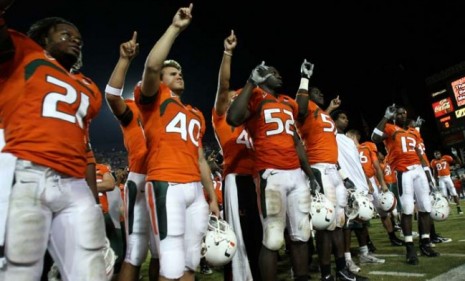U. of Miami's 'booster bombshell': 'The craziest scandal in NCAA history'
A former booster alleges he provided university football players with millions of dollars in illicit benefits over a period of 8 years

A free daily email with the biggest news stories of the day – and the best features from TheWeek.com
You are now subscribed
Your newsletter sign-up was successful
There's never a shortage of college football controversies, but this week, the college athletics world was rocked by what's being called "the craziest scandal in NCAA history" and a "booster bombshell." Nevin Shapiro, a former Miami businessman who is currently doing a 20-year stint in federal prison for fraud, has alleged that he showered dozens of Miami players with improper gifts, from prostitutes to jewelry, over a period of eight years. Here, a brief instant guide to the scandal:
What's going on?
Earlier this week, a Yahoo! Sports report broke the news of "a sustained, eight-year run of rampant NCAA rule-breaking" at the University of Miami following an 11-month investigation into the matter. In a series of interviews totaling 100 hours, an imprisoned former booster named Nevin Shapiro — serving time for his role in a $930 million Ponzi scheme — told the site that he had provided millions of dollars in illicit benefits to athletes from 2002 to 2010. The enthusiastic super-fan said the benefits included cash, jewelry, prostitutes, parties in his mansions and on his yacht, elaborate meals and nights out at expensive nightclubs and strip bars, bonuses for athlete's play on the field, special bonuses for injuring players on another team, and, in one instance, an abortion for a stripper a player had impregnated. "All told, the length, breadth and depth of the impropriety Shapiro has alleged would potentially breach multiple parts of at least four major NCAA bylaws — and possibly many more," says Charles Robinson at Yahoo Sports!
The Week
Escape your echo chamber. Get the facts behind the news, plus analysis from multiple perspectives.

Sign up for The Week's Free Newsletters
From our morning news briefing to a weekly Good News Newsletter, get the best of The Week delivered directly to your inbox.
From our morning news briefing to a weekly Good News Newsletter, get the best of The Week delivered directly to your inbox.
What was the University of Miami doing while Shapiro was breaking all these rules?
According to Shapiro, choosing to look the other way for fear of losing a valuable booster who had donated big-time to the school's athletics program. At present, the school says it is fully cooperating with an investigation into Shapiro's claims. "We will vigorously pursue the truth, wherever that path may lead," said university president Donna Shalala in an open letter on Wednesday. "I have insisted upon complete, honest, and transparent cooperation with the NCAA from our staff and students."
How many people are involved?
According to Yahoo Sports!, Shapiro's detailed allegations finger 73 players, seven coaches, and three support staff members who took part in the impropriety in some manner.
A free daily email with the biggest news stories of the day – and the best features from TheWeek.com
Have Shapiro's allegations been confirmed or denied?
The Yahoo Sports! investigation conducted nearly 100 interviews with individuals in six states, including nine former Miami players or recruits and one coach, and audited tens of thousand of pages of financial, business, and cell phone records. Multiple parts of Shapiro's story were corroborated. The NCAA's investigation is ongoing.
Why is Shapiro coming forward now?
When he was arrested in 2010 on charges of overseeing a Ponzi scheme, he pleaded guilty to fraud and money laundering, and, according to his lawyers, promised to detail his involvement with the Miami team as part of his deal with prosecutors. "They asked him to cooperate and come clean about what... he had done with his money, which was actually investor money," his lawyer, Maria Elena Perez, tells CNN. At Yahoo Sports!, Robinson says Shapiro is also motivated by a feeling of being abandoned by many of the athletes he thought were his friends. After he was arrested, Shapiro says he asked a number of players for financial help with bail money, to no avail.
What now?
"If the assertions are true, the conduct at the University of Miami is an illustration of the need for serious and fundamental change in many critical aspects of college sports," NCAA president Mark Emmert said in a statement. The NCAA has been investigating Shapiro's claims for months, and, it's speculated that the organization might impose the so-called "death penalty" on the university and shut down Miami's football program entirely for at least one year, something it has only done once before, with Southern Methodist University in 1987. Others say that such a penalty is unlikely, given the "massive ripple effect" it would have on other schools in the conference, media contracts, and the like. Meanwhile, under bankruptcy law, University of Miami players who received gifts from Shapiro may be forced to repay the investors Shapiro bilked.
Sources: Alabama Live, Chicago Tribune, CNN, Miami Herald, SB Nation, Yahoo Sports!